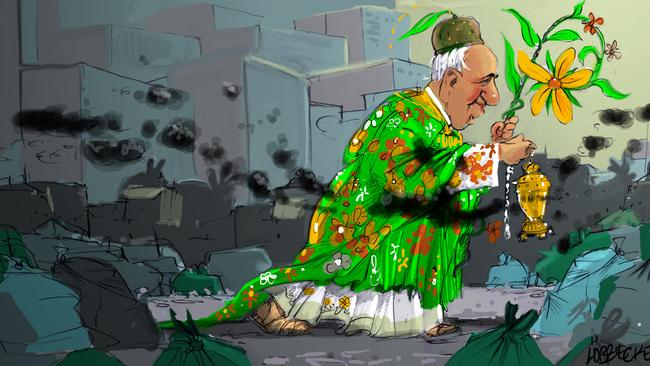
“Nobody is suggesting a return to the Stone Age,” Pope Francis reassures us halfway through his encyclical. Thank goodness for that, since the average caveman and his routinely beaten spouse were lucky to live beyond their 20s.
Life expectancy in the poorest nations today is better than that in the richest nations a century ago, yet the Pope seems unimpressed with this obvious measure of progress in this melancholy defence of the planet.
Welcome to the world of Pope Francis the Handwringer, a pontiff so overcome with gloom that he makes the prophet Job look cheery. His Holiness advocates putting limits on growth “and even retracing our steps before it is too late”.
We should put aside “the modern myth of unlimited material progress”, slow down mechanisation, turn down the heating and put on warmer clothes.
We must adopt new habits such as “avoiding the use of plastic and paper, reducing water consumption, separating refuse … using public transport or carpooling, planting trees, turning off unnecessary lights, or any number of other practices”.
Two and a half centuries after the birth of the Enlightenment the Catholic establishment still struggles with modernity.
The Pope recommends rediscovering the tradition of monasticism to escape the decadence of the metropolis. He equates cities with toxic emissions, urban chaos, poor transportation, visual pollution and noise. They are “huge, inefficient structures, excessively wasteful of energy and water”.
“We were not meant to be inundated by cement, asphalt, glass and metal, and deprived of physical contact with nature,” he says.
Most people, strangely, seem to like cities, finding them convenient, enlivening and enriching places. Far from being profligate, as the Pope contends, cities thrive because of their efficiency, and the larger they grow the more efficient they become.
The iron law of metropolitan expansion from Manhattan to Mumbai is that the productive value of cities increases at a faster rate than population. The expenditure of resources, on the other hand, rises slower than the population. The amount of infrastructure needed to support a city of eight million people is typically 15 per cent less than that needed to support two cities of four million.
Yet the phenomenon of super-linear scaling, like so many of the wonders of the modern world, appears not to have permeated the walls of the Vatican.
In keeping with current intellectual fashions, the Pope takes a conditional view of science and technology, paying scant regard to the material progress of the past century that makes life safer, healthier and more comfortable.
He agonises about excessive consumption and pleads for slower growth, seemingly oblivious to the uncanny correlation between life expectancy and the growth of GDP per capita. He takes up the cause of those who become sick from breathing smoke from fuels used in cooking or heating but is anxious about the ability of technology to change these things.
“We have to accept that technological products are not neutral,” he says, “for they create a framework which ends up conditioning lifestyles and shaping social possibilities along the lines dictated by the interests of certain powerful groups.”
The Pope is troubled by fertilisers, insecticides, fungicides, herbicides and agrotoxins in general. “Industrial waste and chemical products utilised in cities and agricultural areas can lead to bioaccumulation in the organisms of the local population, even when levels of toxins in those places are low.”
He doubts that “technology … linked to business interests” can solve these problems, since it pays no heed to “the mysterious network of relations between things”.
Yet the average life expectancy of a child born today is more than twice as long as a century ago. The astounding increase in the length and quality of life is due almost entirely to technology.
For romanticists who yearn for a simpler life in the pastures, the rise in global life expectancy is a phenomenon they dare not acknowledge. It began to increase in the early 19th century with the expansion of the industrial technology (profit driven, one should add) that so unnerves the Pope.
The most remarkable improvements have been in the developing world. In the country now known as Bangladesh, life expectancy was 21.5 years in 1906. A Bangladeshi child born today can expect to live 3½ times as long.
These little details should delight the Pope, who rightly celebrates the sanctity of life and the equal respect each human should command. The march of progress and economic growth should renew hope in humankind and our God-given ability to improve our lives and increase the utility of the planet.
Yet the pontiff finds it impossible to escape the irrational fear that we are on the eve of destruction.
“Doomsday predictions can no longer be met with irony or disdain,” he says.
“We may well be leaving to coming generations debris, desolation and filth. The pace of consumption, waste and environmental change has so stretched the planet’s capacity that our contemporary lifestyle, unsustainable as it is, can only precipitate catastrophes, such as those which even now periodically occur in different areas of the world.”
The world is entitled to look to the Pope for hope and the path to redemption. Yet the fatalism of the modern era weighs heavy on his soul.
This despairing, despondent and demoralising encyclical is the first papal offering the ABC has taken seriously in the past 40 years. It is all the more troubling for that.
Nick Cater is executive director of the Menzies Research Centre.


